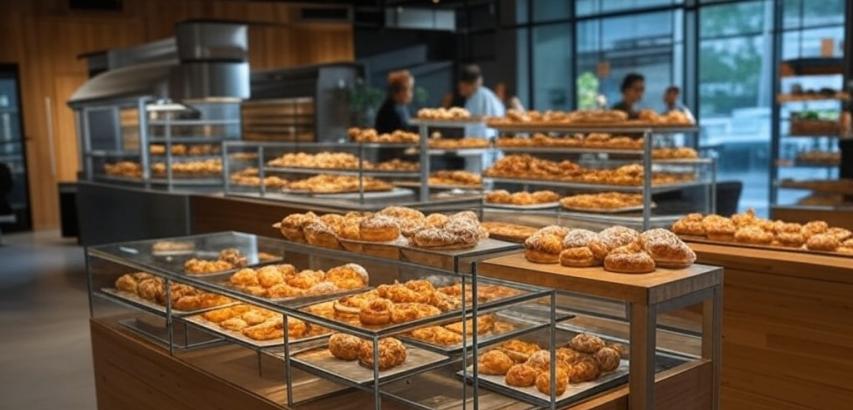Executive Summary
The Smart Bakery Project is a tech-driven bakery that leverages AI, IoT, and automation to revolutionize the traditional baking industry. Our mission is to deliver customized, high-quality baked goods with unmatched efficiency, while reducing waste and enhancing customer satisfaction. By combining advanced technology with artisanal baking, we aim to cater to health-conscious consumers, corporate clients, and tech-savvy urban populations.
Vision: To become the leading innovator in the smart food industry, redefining how baked goods are produced, personalized, and delivered.
Mission: To blend tradition with technology, offering fresh, healthy, and tailor-made baked goods through sustainable and intelligent processes.
Business Objectives
Product Innovation: Launch AI-driven recipe customization for dietary preferences (e.g., gluten-free, vegan).
Operational Efficiency: Reduce production costs by 30% through automation and IoT-enabled equipment.
Market Penetration: Capture 15% of the premium bakery market in the target region within 3 years.
Sustainability: Achieve zero food waste by 2026 using predictive analytics for demand forecasting.
Market Analysis
Industry Overview
The global bakery market is projected to reach $570 billion by 2026 (CAGR: 3.2%).
Demand for personalized, healthy, and convenient baked goods is rising, driven by millennials and Gen Z.
Automation in food production is growing at 7.5% annually to address labor shortages and consistency challenges.
Target Market
Segment | Description |
|---|---|
Health-Conscious | Individuals seeking low-sugar, gluten-free, or plant-based options. |
Urban Professionals | Busy customers valuing convenience and tech-enabled ordering/delivery. |
Corporate Clients | Offices, cafes, and event planners requiring bulk orders for meetings/events. |
Competitive Advantage
AI Customization: Customers design their own recipes via an app (e.g., choosing ingredients, portion sizes).
IoT-Enabled Baking: Smart ovens and sensors ensure consistent quality and reduce human error.
Sustainability Focus: Energy-efficient processes and zero-waste production.
Products & Services
Core Offerings
Smart Baked Goods:
Customizable bread, cakes, pastries, and cookies.
Dietary-specific options (keto, vegan, allergen-free).
Subscription Plans:
Weekly/monthly deliveries of fresh baked goods.
“Surprise Boxes” with seasonal or AI-recommended items.
Corporate Solutions:
Bulk orders for offices, weddings, and cafes.
Branded packaging and loyalty discounts.
Technology Features
AI Recipe Builder: App-based tool for customers to create unique recipes.
Real-Time Tracking: IoT sensors monitor baking progress; customers receive alerts via the app.
Automated Inventory: AI predicts demand and auto-reorders ingredients to minimize waste.
Revenue Model
Revenue Stream | Description |
|---|---|
Direct Sales | Revenue from online/app orders and walk-in customers. |
Subscriptions | Recurring income from weekly/monthly bakery boxes. |
B2B Partnerships | Contracts with corporate clients, hotels, and event planners. |
Data Monetization | Sell aggregated, anonymized consumer insights to food brands (opt-in basis). |
Marketing Strategy
Brand Positioning
“Where Tradition Meets Technology: Fresh, Custom Baked Goods, Made Just for You.”
Tactics
Digital Marketing:
SEO: Target keywords like “custom bakery near me,” “healthy bread delivery.”
Social Media: Instagram/TikTok campaigns showcasing AI-designed cakes and behind-the-scenes automation.
Partnerships:
Collaborate with fitness influencers and nutritionists to promote healthy options.
Partner with food delivery apps (Uber Eats, Deliveroo) for last-mile logistics.
Community Engagement:
Host “Bake with AI” workshops to educate customers on customization.
Offer free samples at tech expos and wellness fairs.
Operational Plan
Facility & Equipment
Location: Urban area with high foot traffic (rent: 5,000/month).
IoT Infrastructure:
Smart ovens (20,000/unit).
Robotic dough mixers and packaging systems (50,000).
Software:
Custom app development (80,000).
Cloud-based inventory and AI platform (10,000/year).
Staffing
Bakers & Technicians: 5 staff (45,000/year avg.).
App Developers & Data Analysts: 3 staff (75,000/year avg.).
Delivery & Customer Service: 4 staff (30,000/year avg.).
Supply Chain
Partner with local organic farms for ingredients.
Use AI to optimize delivery routes and reduce fuel costs.
Financial Plan
Startup Costs
Category | Cost |
|---|---|
Technology & Equipment | 350,000 |
Facility Setup | 150,000 |
Marketing | 50,000 |
Licenses & Permits | 20,000 |
Total | 570,000 |
Revenue Projections
Year | Revenue | Net Profit |
|---|---|---|
1 | 800,000 | -100,000 |
2 | 2.2M | 300,000 |
3 | 4.5M | 1.1M |
Funding Requirements
Seek 700,000 in seed funding (equity or loans).
Allocate 60% to technology, 25% to marketing, and 15% to operations.
Risk Analysis
Key Risks
Technology Failures: IoT/equipment malfunctions disrupting production.
Regulatory Compliance: Food safety and data privacy laws.
Consumer Skepticism: Resistance to AI-designed food.
Mitigation Strategies
Regular maintenance contracts for equipment.
Hire a legal advisor for compliance (e.g., FDA, GDPR).
Offer free trials and transparency about AI’s role in recipes.
Sustainability & Social Impact
Zero Waste: AI-driven demand forecasting reduces overproduction.
Community Support: Partner with food banks to donate unsold goods.
Carbon Neutrality: Use renewable energy and electric delivery vehicles by 2025.
Conclusion
The Smart Bakery Project merges cutting-edge technology with culinary artistry to meet the growing demand for personalized, sustainable, and convenient baked goods. With a scalable model, strong differentiation, and a focus on health and innovation, the project is poised to disrupt the bakery industry and achieve $4.5M in revenue by Year 3.
Next Steps:
Secure funding and finalize partnerships.
Develop MVP (Minimum Viable Product) for beta testing.
Launch pilot location in a high-demand urban area.
This business plan outlines a clear roadmap to establish the Smart Bakery as a leader in the future of food technology.
 |  |  |
